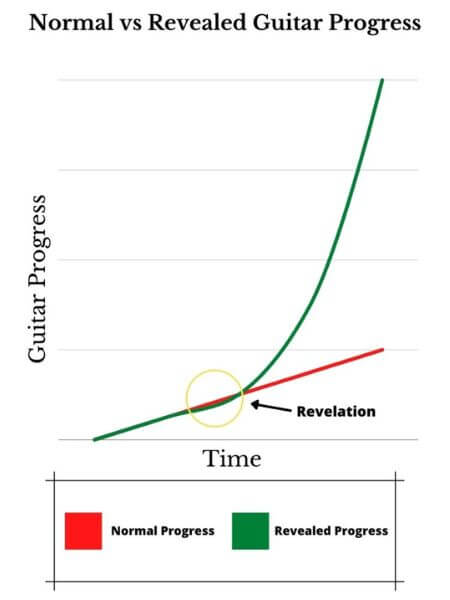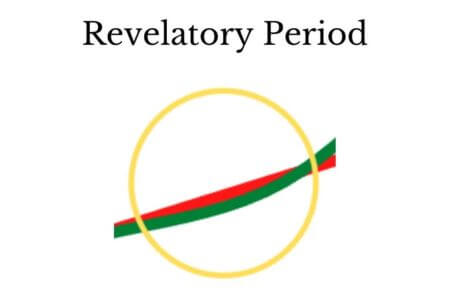The #1 Secret to Guitar Progress
We all want the ultimate secret to guitar progress. Determined to find that secret, I studied the art of effective practice for years. The more I learned, the more I realized why some guitarists improve quickly while others stay at roughly the same level.
Now, most of us would say that the difference between these guitarists has to do with two things: natural talent and hard work.
Natural talent gives you an inborn advantage. If you have a talent for music, more likely to be drawn to it in the first place. You’ll also get more mileage out of your practice time than the average player. You might even have perfect pitch!
Hard work, on the other hand, is the sum of the time and effort you put into the instrument. You gain experience over years of consistent and focused practice. Most people believe that the more hours you practice, the better.
However, I’m convinced that the secret to guitar progress isn’t a question of natural talent or hard work alone. Nor is it necessarily the perfect combination of hard work and talent. I believe there’s a more significant factor to consider.
The Power of Your Guitar Method
I believe that your guitar-learning method almost entirely determines your potential. If your method is sound, you’ll be able to improve faster on fewer hours. Additionally, what we might call your skill-level ceiling will be much higher.
The great Fernando Sor once wrote that guitarists should, “Hold reason for a great deal, and routine for nothing.”
Influenced by the philosophy of the Age of Reason, Sor argued that we should critically examine everything we do on the guitar. He thought much like a scientist, ensuring that his practice sessions yielded consistent results.

I believe we should live by his brilliant maxim. We should hold the logic of our guitar method above all else.
Most of us practice without thinking all that much. We tend to develop our practice routines without really considering how we ought to practice. As a result, we end up with bad habits and lost time.
I believe that our practice routines become our guitar-playing destiny. If we adopt a sloppy routine early and never scrutinize it, we turn into sloppy players. The only way to prevent this is to adopt a sensible method as soon as possible.
But that isn’t the #1 secret to guitar progress. The secret, of course, is the method itself. Unfortunately, this method won’t make a whole lot of sense unless you understand its underlying logic, which I’ll introduce below.
The Structure of Scientific Revolutions
In 1962 the philosopher Thomas Kuhn published The Structure of Scientific Revolutions, an extraordinary book about the history and philosophy of science.
One of Kuhn’s key concepts is that of a paradigm. With respect to the history of science, a paradigm is basically a well-defined set of beliefs that make up a framework for understanding the world. Scientists apply these paradigms (sometimes unconsciously) when interpreting the data they collect from experiments.
Kuhn argued that the most important progress in science comes from paradigm-shifting revolutions rather than normal, everyday science. This made quite a stir, especially since he believed that the transition from one (broken) paradigm to a new paradigm wasn’t strictly objective.
One example of such a paradigm shift occurred when Charles Darwin published On the Origin of Species. The idea that all life (including humans) evolved from a single common ancestor completely changed the face of biology. Since Darwin’s revolution, virtually all of biological study has been informed by evolutionary thinking. There is, in effect, a new normal.
The central point we should take from The Structure of Scientific Revolutions is that progress isn’t always what it seems. We expect it to go from A to B at a constant speed, but sometimes we get a sort of unexpected leap from A to E, and we’re left reeling, wondering what the heck just happened.
The Structure of Guitar Revelations
In my view, our personal progress on the guitar operates much like the pattern we see in the history of science. However, rather than framing certain “leaps” in progress as revolutions, I prefer to consider them revelations.
A revelation can be defined as the sudden realization of a great truth. Of course, this word is typically used in a religious context, but in our case, revelation is a powerful yet secular phenomenon.
You might be wondering why I use the word “revelation” rather than “enlightenment.” The way I see it, guitarists need to have a series of profound realizations rather than discovering everything at once, which the concept of enlightenment implies.
A guitarist’s revelation usually amounts to a reworking of their current musical paradigm. This could relate to their practice method, their experience of listening to music, their view of the guitar, or their view of themselves as a guitar player.
I couldn’t hope to be exhaustive in discussing guitar revelations. They come in many forms, and they reveal themselves according to your musical and spiritual will. You should seek out these experiences and accept them as they come.
The big mistake most guitarists make is to settle into a certain mode of practice as the norm, never questioning their method or relation to the guitar. In effect, they’re stuck in a broken paradigm.
Remember that the more you aspire to be, the more you will become. As you begin to connect with your inner guitarist, so will the great truths of music be revealed to you, one by one.
Normal Progress vs. Progress by Revelation
Most of the time, we’re making “normal” progress. We carry out our practice routine, and we get the results we expect. We don’t suddenly get much better or worse, and we don’t question or change our method. Like the tortoise, our motto is slow and steady.
Progress by revelation on the other hand, or revealed progress, is just the opposite. Our spirit is struck by lightning. We feel that something tremendous has happened; our guitar looks, feels, and sounds different from before. Our normal practice routine slows or stops completely. We soon notice a dramatic change in our abilities. Like the hare, we’re running or we’re sleeping.
A Progress Parable

Imagine two people, John and Amy, who believe they have no choice but to tunnel through a thick wall of concrete to reach their goal. They’re each equipped with a spoon.
John and Amy begin working at the wall with their spoons. The work is painful and frustrating, but they make a little bit of progress each hour. They estimate they’ll reach their goal in about twenty years.
After two years of toil, Amy steps away from the wall. She rests for a period, then begins to analyze their situation. At first, it seems as if their spoon-strategy is still optimal. However, Amy’s intuition tells her there may be another way to their goal. She applies herself to the problem for months on end.
Finally, Amy tells John that she’s discovered a new path, one that will lead them to their goal in a matter of days. Together, they abandon the wall in favor of the alternative route.
I hope this little parable helps you understand what I mean when I differentiate “normal” from “revealed” practice.
As you might have guessed, chipping away at the wall represents “normal” practice, while Amy’s questioning (and subsequent reframing) of their strategy represents “revealed” practice.
John and Amy might well have dug through that wall for twenty years and reached their goal. That would have been a legitimate approach. However, a little bit of out-of-the-box thinking can often go a long way. In my view, that’s just what guitar players need to revolutionize their development.
A Visual Guide to Maximizing Guitar Progress
I’d like to illustrate my distinction between normal, everyday practice and revealed practice with the following graph:

The red line represents the sort of progress we make most of the time. We follow our normal playing routine and we improve slowly but surely. The green line, however, represents a normal routine that becomes shaken up by a revelatory experience.
If you look closely at the “revelation” phase I marked with a gold circle, you’ll notice a slight dip in the green line’s progress before it shoots exponentially upward:

This dip reflects an interesting aspect of the revelatory period. As I mentioned above, the paradigm-breaking musical and spiritual changes that accompany a guitar revelation will disrupt your normal routine. Thus, your guitar progress will temporarily slow or stop.
You’ll remember from the parable above that Amy needed to step away from the wall and rest before she could reconsider their predicament. She stopped her “normal” practice (chipping away with a spoon) in order to invest in a better solution.
From John’s perspective, this might have seemed like sheer laziness. He might even have resented her for it. However, Amy recognized that she could make progress along a hidden axis, saving both of them time and energy in the long-run.
The #1 Secret to Guitar Progress
All told, the #1 secret to guitar progress is to do everything in your power to encourage these revelations.
How should you go about doing that? I’ll list a few tips below.
- Be a musician first and a guitarist second. You will greatly accelerate your development as soon as you become devoted to music itself rather than guitar playing.
- Remember that guitar playing is mental as well as physical. Not only is it possible to practice mentally, but I highly encourage you to do so. As you might imagine, revelations themselves are mental phenomena. You can learn about mental practice here.
- Turn your fears into curiosities. Instead of being afraid of all the guitar knowledge out there, you should become an eager student of all there is to know. If you’re hungry to learn, check out my recommendations page.
- Critically examine everything about your practice routine. If you’re putting in time without seeing serious results, you’re doing something wrong. Check out this post for more information on how to practice.
- Learn from excellent players. Watch them and listen to them. You should tell yourself that you can get to their level. Never assume someone’s better than you’ll ever be. If you don’t aim high, you’re certain to miss.
- Remember that a guitarist is only as good as their practice sessions. The more you practice well, the faster you’ll improve. It may take a lot of time to become a great player, but it doesn’t take a lot of time to practice well. It takes discipline.
Overall, you should be willing to accept change as it comes. Revelation is truly nothing more than a change of mind. Change your mind and you will change your life.
Conclusion
If you’re the sort of guitar player who wants to make revealed progress, you have to be willing to shoot for a target that no one else can see. Others won’t understand what’s happening. They’ll be monitoring outward signals, all while your energy is channeled inward.
Perhaps the greatest challenge you’ll face is to be patient during this phase. You’ll be moving forward in total darkness. Be sure to trust yourself and your method.
In time, your inner progress will turn outward, and you’ll appreciate the result.
Thanks for reading!
Are you looking to upgrade your gear or browse some awesome guitar learning materials? Check out my recommendations page to see all my favorite stuff.
Want to streamline your fingerstyle guitar progress? I just released my new ebook, Fingerstyle Fitness, which presents 10 easy exercises to quickly develop your fingerstyle chops. Grab it today!